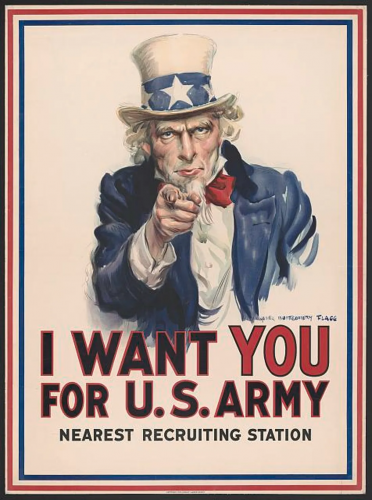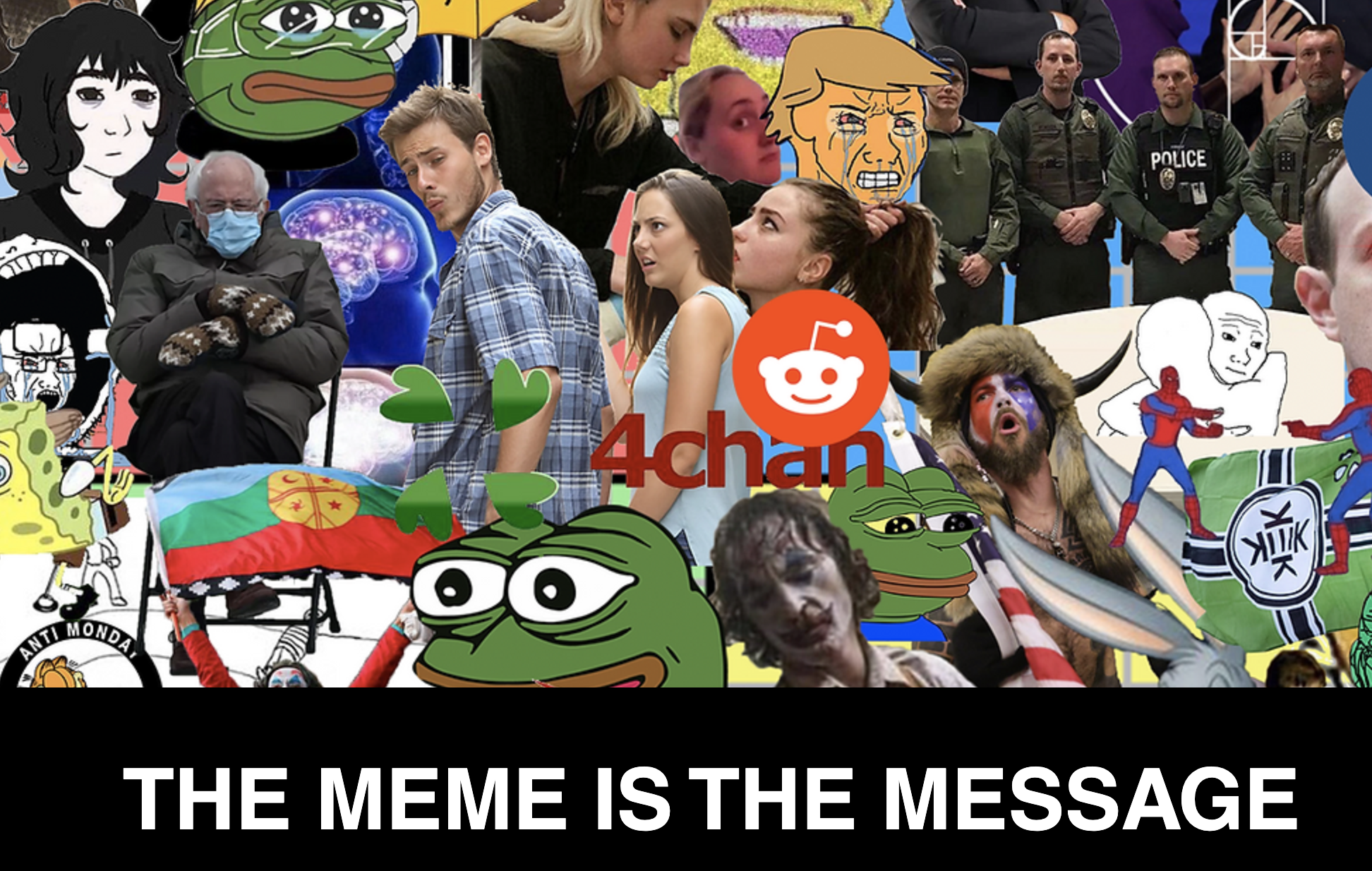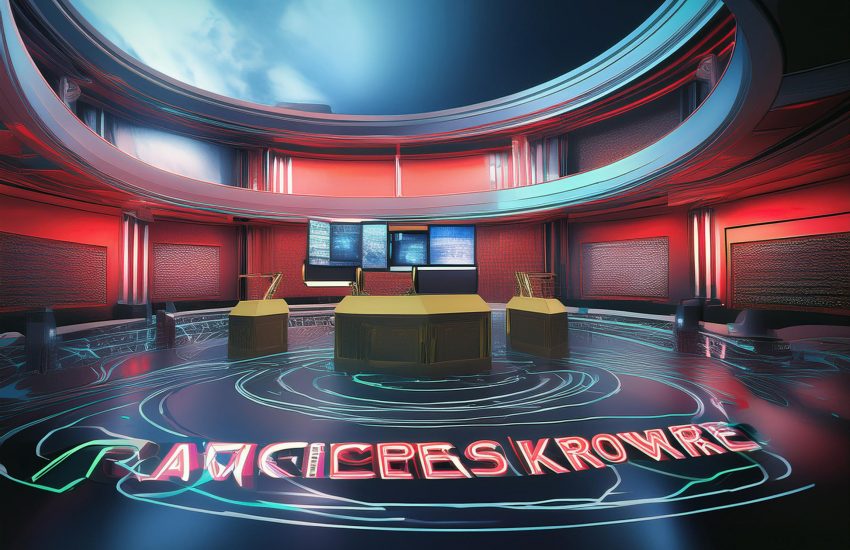From the frontlines of the meme war: Taraneh Azar pioneers new forms of internet reporting
Everyone is familiar with memes. We share them with our friends, and they’re always good for a quick, low-effort laugh. Some people even make their own, and online tools have only enabled that further. This ease of access is incredibly helpful to online communication, and a meme’s overall usage for comedy and camaraderie has only evolved over the past several years.
However, the charming nature of memes has disguised something ugly that has arisen. Where memes can be a vehicle for a simple joke, they have been adopted by extremist communities, often on the far right. These memes involve coded messages, peddling disinformation and perpetrating hate. And this hate, combined with the convenience of a meme, can create a communicative “virus” that allows meaning to be transmitted easily.
In Taraneh Azar’s analytical story “Propaganda of the digital age: How memes are weaponized to spread disinformation,” for USA TODAY, they take an analytical dive into the numerous examples of memes online, synthesizing an argument for how memes fit into our current socio-political landscape. Storybench caught up with Azar, also a Northeastern alum and Storybench staffer, to go behind the scenes on the making of the analysis and to talk about the “internet beat.”
This interview has been edited for clarity and length.
What led you to study this?
In 2015 I was a Tumblr kid, and I remember seeing Pepe the Frog shift from this funny, ironic, strange symbol, cartoon frog to this symbol of the Alt-Right, flooding news feeds and nightly news. And the Hillary Clinton campaign put out an explainer, and it was everywhere in the media and in conversations just hearing about how it had transformed into this symbol of the Alt-Right. For me, that was a really interesting shift, wrapping my head around “How was this symbol co-opted? That’s also like a meme, that’s also something that I have T-shirts and pins of.” That jump was really staggering for me.
This was way back when I was in Northeastern for one of my journalism classes. [There was a] project, and I decided to do a deep dive into it, so I reached out to Matt Furie, who is the creator of Pepe the Frog. He got back to me, and we talked about Pepe and that was kind of the start of everything. I decided that I wanted to make a career out of Internet reporting, not necessarily just about memes, but online community and the content we share online in general. So I got the green light for this big investigative piece for USA TODAY on memes and disinformation… This form of media [(memes)] is so trustworthy in the sense that it’s by the people, for the people, so because of that it is ripe for exploitation and propagandized messaging and shifting narratives — just because no one kind of expects that memes would be the format that governments and political operatives and groups would try to indoctrinate people.

Do you think the same level of disinformation present today could be present in other times, or is the internet a crucial assistant to this?
Conspiracy theories have always existed, and regardless of whether they’re relating to politicians or social movements, elites, whatever. But because of the internet, the ability to share that information is at an unprecedented level. In that sense, QAnon is the conspiracy theory that kind of incorporates all of the things that were mentioned, like the child sex trafficking and the idea that Trump is a savior. QAnon is every conspiracy theory on steroids, in the sense [that] it incorporates everything, like the illuminati stuff, antisemitic stuff, the anti-establishment stuff. Everything is sucked into this big conspiracy. QAnon is a product of the internet, in that sense.

I don’t necessarily think a conspiracy theory with that scope and reach could exist, certainly not in the same form as QAnon. But conspiracy theories have always existed and what we’re seeing online today is just conspiracy theory, mobilized through memes, mobilized through other content. As a function of the platforms that they’re proliferating and amplified on, I think that’s really what the internet does. It takes the things that have always existed, and it increases the speed and the reach and the scope and the rate at which things change and shift — and more often the rate at which people are brought onto things or turned off by things. So I think it’s just what we’ve always seen in the sense but so amplified beyond the scope of pre-Internet conspiracy or culture or thought or social movement or whatever that may be.
A lot of people in the so-called “meme” crowd claim their jokes/memes are ironic to avoid accountability. Was it difficult to account for this ‘irony’ in your studies?
I’m a digital native. I grew up online. I can understand the layers of irony that are incorporated in different memes and different formats. I’ve also been paying attention to the kind of content that far-right extremist groups, or anyone, really, are sharing that incorporates irony to a certain degree. In that sense, I get it. And for me, it wasn’t difficult. But there were definitely points in time where people that I was working with on the team or my editor, we had to go through and make sure “Are we understanding what this is meant to be?” So in that sense, irony as a tool to encode and catch whatever the message may be.
Especially when it comes to really … hateful content — the messaging is [often] really smart. That is a really, really smart move. Not only does that completely bypass any calls for accountability, but it also is really good at surpassing content moderation on a lot of platforms. Humor is protected by the community guidelines on Facebook and Instagram and Twitter. When it gets down to “I can’t tell if this is like a hateful message” — that type of nuance and encoded messaging is really effective and really harmful. You’re able to reach way more people and platforms are compelled to tolerate you. They can’t tell what you’re posting.”
We had to go through and make sure ‘Are we understanding what this is meant to be?’
Taraneh Azar
Do you think that the far left could fight back in the Meme War, or is too inherently far-right?
Personally, I have seen lots of Communist groups use memes effectively in a form of meme warfare. Especially like Marxist-Leninists, Tankies, people who are interested in going back to some authoritarian state. The reason why the right is so well poised to use memes and irony and humor in the way that they do is ultimately identity politics — like trolling people and making fun of their identity and making fun of what they stand for on really sensitive topics. A lot of people end up taking the bait, engaging in an authentic way, engaging in a way that tries to plead to reason. But [in] the meme game, there’s no room for reason. Like if someone is coming at you with irony and humor, you have to respond with irony and humor. Otherwise, you’re gonna get wrapped up in this rolling cycle. So I do think that any group could effectively use memes.
How important do you think the person who shares the meme is compared to the content itself?
Both. When we’re looking at memes that are really successful, there are some examples of memes shared within groups anonymously. Pepe the Frog is a good example of that. Pepe the Frog gained popularity on 4Chan and other image boards on 4Chan through anonymous sharing. So it didn’t really have to do at all with who was sharing it. But when we look at Pepe the Frog hitting the mainstream, there were amplification points. There were celebrities who were sharing pictures of Pepe. There were politicians who were sharing pictures of Pepe. So when we look at that, Pepe the Frog didn’t need those amplification points. [It] was already popular in online communities before amplification points came into play.
But when we’re looking at other memes, oftentimes what we’ll see is that something will originate on an image board, or originate somewhere on some pocket of the internet. And then a politician or a spokesperson or a celebrity or some sort of public figure will share that meme. Then it will be forced into public awareness. In that sense, the person matters. Also, the degree of trust. For example, if you’re scrolling on Facebook, which is a very identity-driven platform — you know, your friends and your family and your followers or whatever. If you’re finding content on Facebook, it’s likely that you know the person or you trust them for some reason. You’re in the same group, the same community. So in that sense, it’s not so much about who’s sharing it, but the role that they play.

What do you think is next in terms of meme-warfare now that political figures have legitimized it?
I think that memes are increasingly going to be something that everyone uses. Not just conservative or populist politicians, but also the institutional elite. When Biden decided to enact the student loan forgiveness, the White House adopted the “This you?” format, responding [to people who were] critical of Biden’s decision to do the student loan forgiveness, and they were posting screenshots of their PPP loans being forgiven. I think that it tested the media literacy of the people who are running these accounts. I know that a younger woman from New Jersey, for example, is running the White House Twitter page right now, and she’s taking more liberties, obviously. You’re seeing the White House official communications page starting to meme, and I personally think that’s really good. Not just because they’re meme-ing, but because they’re showing that they actually can engage in that way. You see a lot [of the] traditional communication formats, like press releases and official statements. They’re very ill matched to communicate messaging in the Internet age, so I think we’ll see more people be literate in the game.
‘Kek’ also has origins in the MMORPG World of Warcraft as a translation of ‘LOL.’ To what extent does this root in gamer culture influence meme warfare?
I think a lot of what we see with the aggrieved, white, American man between the ages of like 17 and 40 stems from gamer culture. People have written about how Gamergate poised us for 2016, and they’ll write about being disillusioned by society in the sense of being a white man. It’s in many ways dominant on image boards. Image boards originated to honor niche interests. I don’t think gaming is a niche interest, but I think that a lot of people go to image boards to discuss gaming and discuss gaming culture. I think that underpins a lot of this stuff. So Kekistan — I wouldn’t say is like a central factor or theme in meme warfare, I think at one point it was. I think now it’s less relevant and less people are using it, and it’s “cringe” in some ways. But it is a really interesting example of how all of these factors came together. [Kek] is a translation of “lol,” and you’ll see a lot of people use that online. It’s like “lol, lol, lol,” “Kek, kek, kek.” So in that sense, I think it speaks more to this notion of meme magic that a lot of far-right players and operatives use but also just like random people online who want to create and spread chaos in society.
There is this synchronicity, this link between “Kek” as a word, as a translation of
“lol,” and Pepe the Frog. The fact that [is that] “Kek” is “lol,” but also this Egyptian frog-headed deity, lord of chaos type figure. And it’s represented by a frog-headed figure, and that’s Pepe the Frog. All these things come to illustrate a really good example of how you have group culture and then synchronistic thinking. And then the manipulation, like “let’s make a flag that looks like the Nazi flag.” And it’s green and it’s “funny,” and from 4chan, and that’s “our” symbol, and no one really knows that this is a joke or not.” It doesn’t matter if it’s a joke —we’re gonna use it, and attach it to really hateful messaging. They’re gonna be confused on the outside, because they’re gonna wonder “Is this a joke? Is this real?” We won’t even give them a chance to figure it out, we’re just gonna show up like Charlottesville, like January 6th, and we’re gonna troll the media. We’re gonna put out really confusing explainers of what this is so they have to look really embarrassing trying to decode it. I think it’s a really good example of this really confusing thing that doesn’t make any sense, and so when people try to like make sense of it, unless you’re in 4chan archives and going through a bunch of deep dive shit, you’re just gonna look confused because it’s confusing.

What is the ideal takeaway you would want someone to have after finishing this piece?
The ideal take away would be that memes are important. They matter, and they’re worth studying, and they’re worth being discerned. They’re everywhere, and lots of them are funny and some of them are harmless. But just because of the nature of the format, they are ripe with disinformation and misleading content and hateful messaging. In that sense, be aware of what you’re looking at, and don’t think that you understand the message behind it. Because memes are anonymous by nature, and therefore you can never really know the true intent. Be aware of what you’re sharing online, and take whatever steps you’re able to to understand more of what you’re sharing online.
Do you have any advice for people who wish to study this space?
I would say that Internet reporting is really interesting, just because narratives are often laid out online. This was one of the first articles that I had written where I wasn’t inferring the anecdotal figures. The content creators, the people who are making and sharing memes … do not factor at all into this article, because all of the information, all of the narrative, the whole story was online in archives waiting to be found. In that sense, my advice would be to dig online, find the threads, and just because you’re aware of it, doesn’t mean other people are. There is so much limitless opportunity for writing about whatever niche random thing that you and your friends are steeped in, that no one else knows about all. It’s all relevant and interesting.





